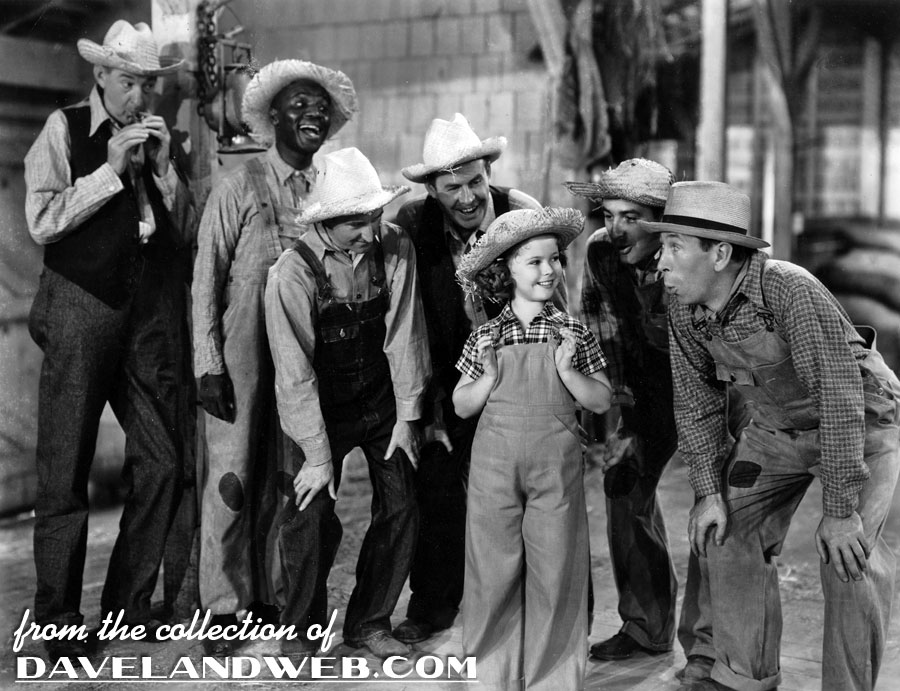
Jule Styne was a songwriter and composer best known for the Broadway musicals “Gypsy,” “Gentlemen Prefer Blondes,” and “Funny Girl.” Having seen him referred to as Shirley Temple’s vocal coach on a few of her 20th Century-Fox childhood films, I was interested to learn more about what he actually did for her and why he was assigned that task. The American Film Institute website lists Styne as vocal coach for “Heidi,” “Rebecca of Sunnybrook Farm,” and “Little Miss Broadway” (albeit uncredited in the films themselves). I hunted down a biography of Styne, hoping to get the 411. I discovered Jule: The Story of Composer Jule Styne by Theodore Taylor and anxiously awaited its arrival. To say I was disappointed was an understatement.
According to the book, it appears that Styne began work at Fox in 1937:
Jule received a surprise phone call from Lou Irwin, liaison man in New York for Joseph Schenck. Irwin said…that Fox was in trouble with its musicals; that a good vocal coach was needed to assist such stars as Tony Martin, Alice Faye, and Shirley Temple. Irwin said that Fox was prepared to offer $350 a week plus travel expenses to the West Coast.…A few days later, Jule received a personal call from Mr. Schenck, which in terms of the movie world, was comparable to talking to the White House. The film mogul advised, “You don’t know anything about Hollywood, so just don’t jump in. When you get to the studio, take a couple of weeks to familiarize yourself. Visit the sets; go to the music department; the dance department. Tell them I said not to rush you into anything.” Jule remembers being in a happy daze during the call from Schenck.…It was miracle time. “Shirley Temple?” recalled Styne in 1977. “Listen, I was afraid of that kid. I didn’t want to get in the middle with her. From Schenck and Zanuck on down, everyone humored her. I’d have to play games with her to get her to rehearse. Games, games and finally we’d get down to work.”
Say what? Someone who worked with some of the greatest (and most temperamental) vocal talents of all time was afraid of seven-year-old Shirley Temple? This seemed like an odd statement with very little support. I continued to read.
Jule reported to the music department at 20th Century-Fox, which sprawled over many acres facing Pico Boulevard, across from the Hillcrest golf greens, on the edge of Beverly Hills. Simply because he’d been hired in New York, and by none other than Joe Schenck himself, Jule was immediately viewed with some suspicion. Whose job was to be pirated by this unknown vocal coach? Was he a spy with a hot line direct to Schenck? Even worse, to Darryl Zanuck, head of production? Had he been sent out, in fact, to take over the entire music department? Hollywood never trusted New York, and vice versa, and insecurity buried behind most welcoming smiles.
The book mentions that he started working with the Ritz Brothers on the movie “Pigskin Parade.” Wait…wasn’t that a Judy Garland movie? Oh…that was the working title of “Life Begins in College” (released October 1937). Strike one for author Theodore Taylor. Missed details like that make me question the rest of the research.
[Jule was assigned] a bungalow at the lower end of the lot, behind the sound stage complexes…Across the street was Shirley Temple’s bungalow and the sound of the child’s temper tantrums occasionally disturbed the quiet. Jule didn’t look forward to coaching her. The vocal coaching began a few days later with whatever star was scheduled to sing in whatever upcoming picture. The assignments were made by the music department. “I’d work half an hour a day with one or another of them if they were scheduled to sing in a picture. In that area, I now knew what I was doing.”
Half an hour? One can barely get warmed up in that time, let alone get into any serious kind of coaching for even just one song. Interesting…
But almost daily Jule was instructed “not to make waves.” Further, he was told “you fellows from New York just don’t understand. This is how we do it out here; this is how it should be done; this is how it’s always been done. The system functions, let it alone.” But the temptation to buck the system was irresistible. It doesn’t matter what rules you have, Jule thought. Good is good. Bad is bad, Hollywood or New York. Talent is talent. No talent is no talent.
I also take exception to the statement about talent. Singing on a Broadway stage takes a very different kind of training than for one who sings on celluloid. There are also many different types of singers; some have amazing vocal pipes (Judy Garland) and some fall under the category “song stylist.” While those may not be the most talented singers, by talking/styling/singing the lyrics, they still create a pleasing vocal performance. Shirley was definitely a stylist. Her range and projection could not begin to compete with Garland, but her pitch was more than adequate and the natural quality of her singing is what made audiences fall in love with her. The voice fit the child. Why do you think it took so long for Judy Garland to make it big? The child’s body did not fit the adult voice.
Almost from the start, [Jule] was not very well liked in the music department at Fox. He made the mistake of saying too often, “That doesn’t sound right to me. I’m sorry to tell you that is a wrong note.” At his first meeting with Zanuck, regarding vocalists, Jule remembers the studio chief saying, “Don’t tell me that a song has to be sung more than one chorus. When you sing a song once, why sing it twice?” Zanuck was correct, in Jule’s opinion. The screen never begged for encores. Zanuck said, “They [the singers] go into waltz time. They parade all around the set. This whole song thing is screwed up.”…Then Zanuck yelled to Jule, “They do ballads around here for five minutes. You can’t shoot a song that long. It won’t hold. You shoot it through the harp, through the violin, then what? People in the music department will hate your guts but I want this song thing straightened out.”
This part of the book rings true. Zanuck was more comfortable with dramatic pictures; musicals were not his forte. He was great at editing a movie down to its essential parts and trimming out the fluff, so it only stands to reason that his approach to musicals would be the same.
Jule then learned from Zanuck that there was another reason he’d been sent out by Joseph Schenck. Songwriters demonstrated their songs for a producer or director but it was almost impossible for those creators to determine, unless they had long experience, whether or not the song was good or bad for a particular picture; whether or not it could be sung by the star or stars. Time and money were continually lost because of the choice of wrong material; then the picture’s production values suffered. Zanuck wanted Styne to begin monitoring the song demo sessions.
This most likely did not refer to Shirley, for whom Zanuck assigned the same songwriters over and over again, such as Mack Gordon, Harry Revel, Walter Bullock, Harold Spina, and Lew Pollack. They knew Shirley’s strengths and weaknesses and wrote specifically for her.
One of the funniest anecdotes of the book deals with Shirley’s costar in “Young People” (1940):
“If you can make Arleen Whelan sing, it’s worth fifty thousand.” The figure alone was enough to linger in memory. Jule replied that he might as well be requested to climb the Eiffel Tower. “You can do nothing?” Zanuck asked. Jule answered, “I can do nothing to help her.” Zanuck said he appreciated the honesty, and so ended the brief, one-sided conference.
Whelan was a manicurist in a barber shop when discovered by Fox director H. Bruce Humberstone. She never lit up the screen the same way that Linda Darnell did.
Jule was afraid of Shirley Temple, for good reason. Zanuck had inherited the curly-haired, temperamental moppet from the old Fox company.…Shirley Temple was a solid,-sure-fire money maker for 20th Century-Fox and the child captain of the “Good Ship Lollipop” was in full sail when Jule began the unenviable task of polishing her voice and making her arrangements. The only people who could reliably handle her were dance director Nick Castle and the great black dancer, Bill Robinson, who had paired with Temple in “The Littlest Rebel,” 1935. But she stole scenes from Robinson as well as she had from such expert thieves as Lionel Barrymore. Shirley’s bungalow had been built by the studio especially for her, and in some ways resembled a playground. The only things missing were fairies with glittering wands. Jule hated the walk across the street to prepare her for such pictures as “Heidi,” “Rebecca of Sunanyrbook Farm,” and “Little Miss Broadway.”
I’d like to know what research Taylor did that came up with Shirley being temperamental. Based on the plethora of accounts I have read, ANY temperamental behavior exhibited by Shirley was modest and definitely the exception to the rule. I’ve read director David Butler’s autobiography (“Bright Eyes,” “The Little Colonel,” “The Littlest Rebel,” “Captain January,” and “The Story of Seabiscuit”) and he has nothing but praise for the talented and professional child star. As for the snide comments about the bungalow, sure it had a swing in the front yard, but the inside was fully functional with a kitchen, study area, toys, and a piano for rehearsal. What the heck else would you expect to be built for a child of that age?
There was never a way of knowing what mood she’d be in. Her father or mother were always with her, and she didn’t appear to have much respect for them, though her mother, Gertrude, seemed to have the most control.
The studio once sent Jule to Shirley’s Palm Springs home to rehearse. Usually, no one from the studio came near that house.
The Temples didn’t own a home in Palm Springs. They often vacationed at the Desert Inn…yes, vacationed, meaning they got away from the studio and work, which is why nobody from the studio came near “that house.” From the Palm Springs Life website:
Back to Taylor’s questionably researched text:
The morning started off with badminton, and Jule played in the hot sun until he almost dropped. “She was tough as nails, stamina of a steam engine.”
Finally, he went to her father, George, a Pennsylvania Dutchman, to say, “We should start rehearsing soon.”
George then said to his daughter, “Honey, you have to stop playing now and start rehearsing.”
She screamed at him, “Look, I earn all the money in this family. Don’t tell me what to do.”
Jule was embarrassed and walked on into the house, staying there until she decided she was ready to work.
I have a hard time believing this little anecdote, especially Shirley “screaming.” Regardless, the most disappointing part of the book is that it never touches on exactly WHAT Styne did for Shirley. Taylor focuses on gossip and falsehoods instead of giving what could have been a very interesting account of how Style helped transition Shirley from childish singing sensation to a more professional musical star. My guess is that Styne preferred to work with singers who were ready-made (like Alice Faye) and didn’t require anything too intense, thus the thirty minute sessions. The bitter recollections of Styne may have to do with the fact that Zanuck fired him in 1940 and told him to stick to songwriting, not coaching.
See more Shirley Temple photos at my main website.

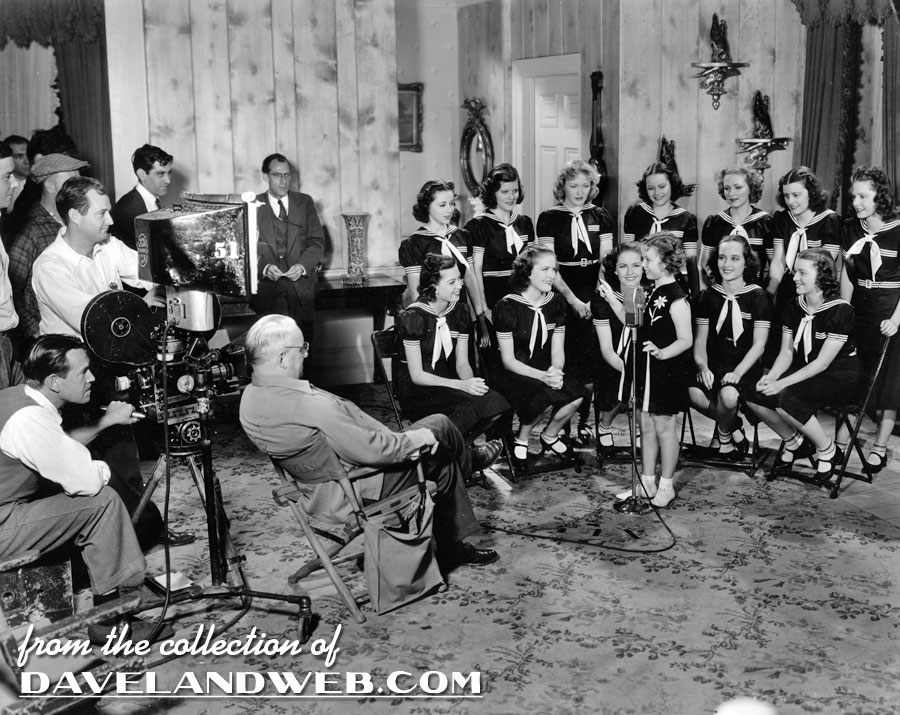
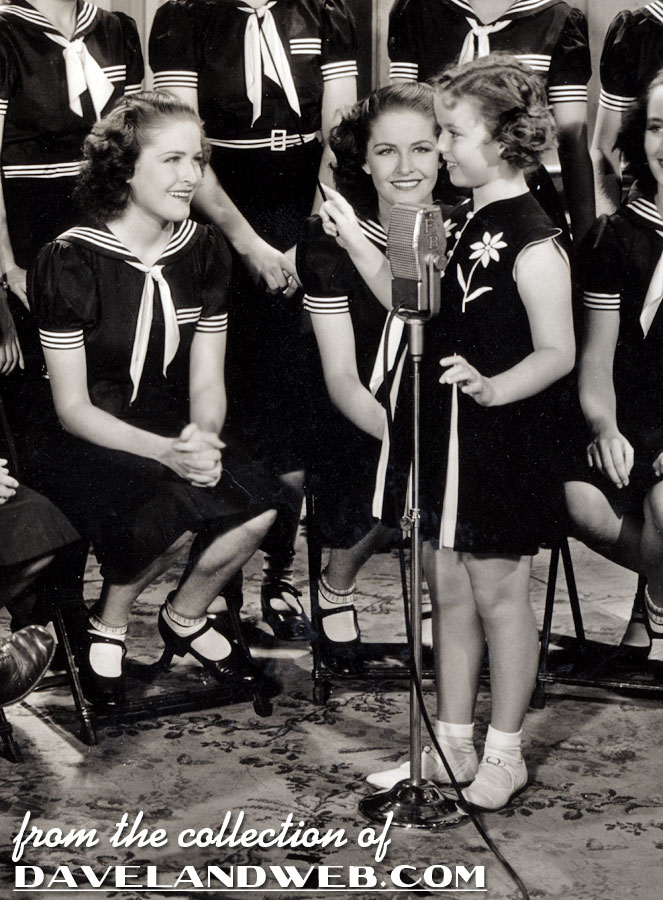
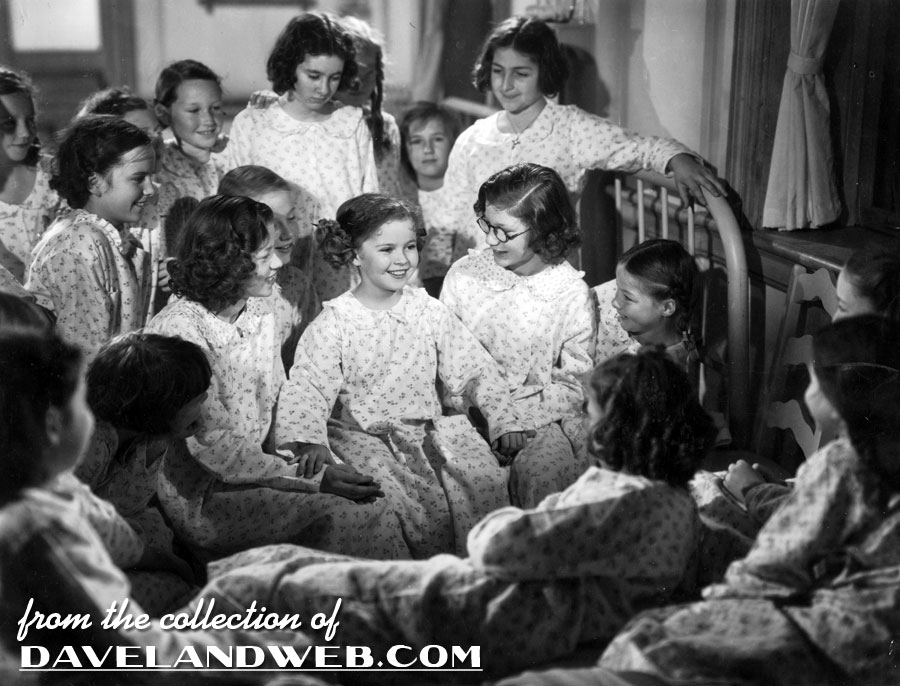
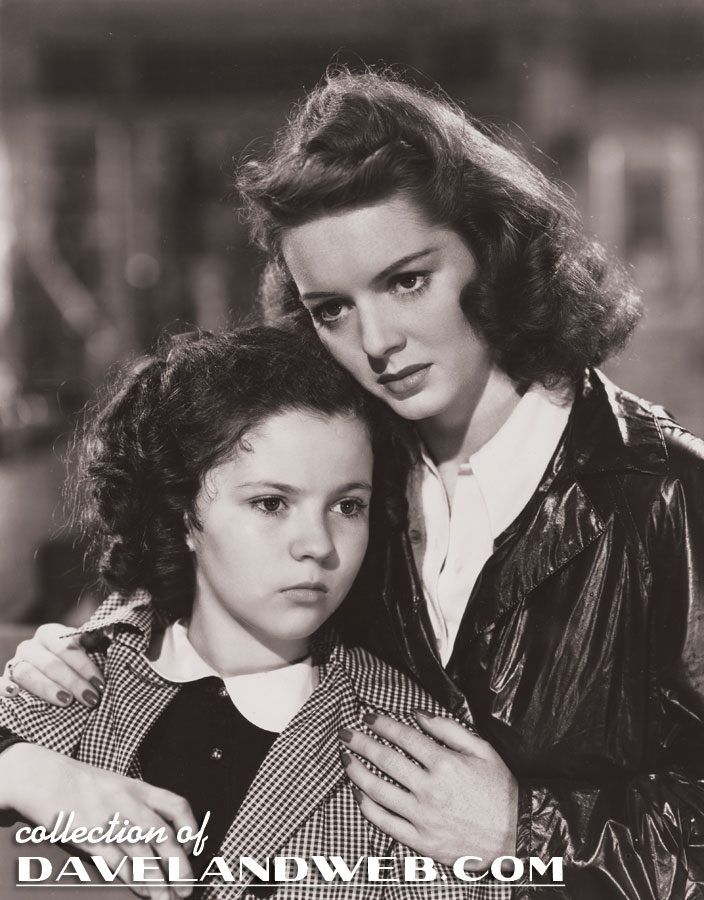
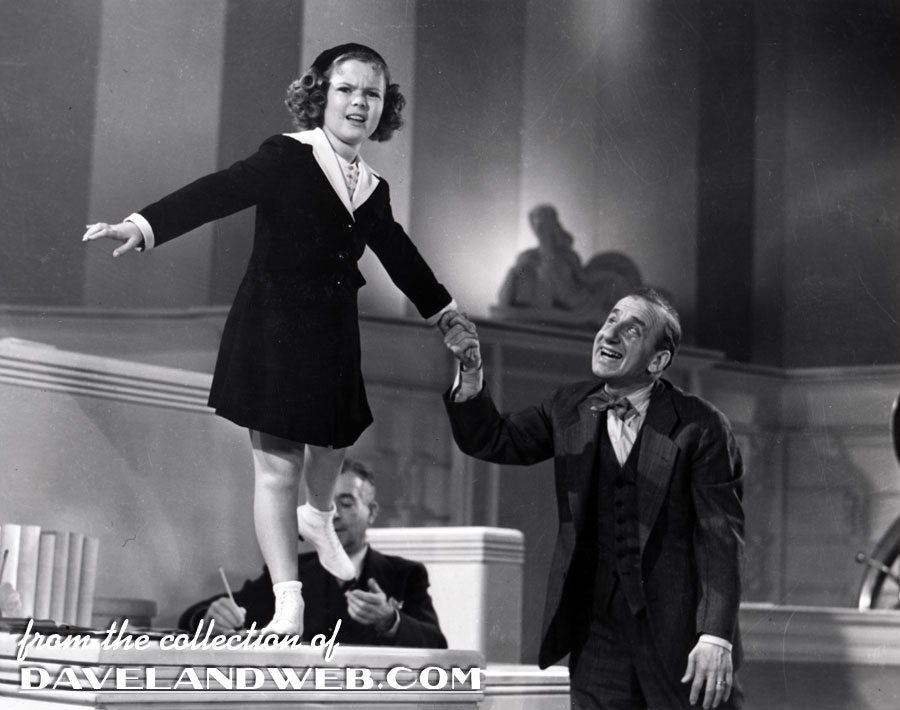
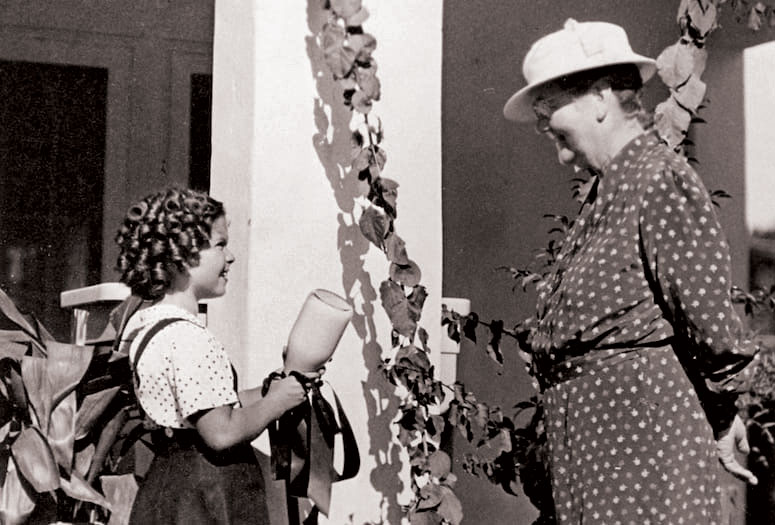
1 comment:
Sometimes it takes reading a bad book to tell you that you can write better than that and should write a book. I look forward to buying any book you write.
Post a Comment